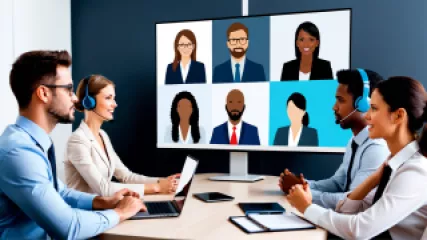Effective Strategies for Virtual Conflict Resolution Therapy
Welcome to our tutorial on effective strategies for virtual conflict resolution therapy. In this guide, we will explore the various techniques and approaches that can help you navigate relationship conflicts in a virtual setting. Whether you are a conflict resolution coach, counselor, or simply seeking ways to manage conflicts within your own relationships, this article will provide you with practical steps to promote understanding, communication, and resolution.
Understanding Virtual Conflict Resolution Therapy
Virtual conflict resolution therapy refers to the process of addressing and resolving conflicts through online platforms or technology-mediated communication. With the rise of remote work and distance learning, virtual conflict resolution has become increasingly relevant and necessary. It allows individuals to engage in conflict resolution sessions without the need for physical proximity, providing convenience and accessibility.
While the principles of conflict resolution remain the same, virtual settings present unique challenges and opportunities. The absence of face-to-face interaction can impact nonverbal cues and create barriers to effective communication. However, with the right strategies and tools, virtual conflict resolution therapy can be just as effective as in-person sessions.
Step 1: Establish Clear Communication Channels
Clear and effective communication is the foundation of conflict resolution. In a virtual setting, it is crucial to establish clear communication channels to ensure all parties can express their thoughts, emotions, and concerns. Here are some steps to follow:
- Create a secure and reliable platform: Choose a video conferencing platform that ensures privacy and confidentiality. Familiarize yourself with its features to make the most out of the virtual session.
- Set guidelines for communication: Establish ground rules for respectful and constructive communication. Encourage active listening and discourage interrupting or talking over each other.
- Encourage video participation: Whenever possible, encourage participants to turn on their video cameras. Visual cues can enhance understanding and connection during the session.
Step 2: Foster Empathy and Understanding
Empathy and understanding play a crucial role in resolving conflicts. In a virtual setting, it can be challenging to perceive emotions and nonverbal cues accurately. However, with intentional efforts, you can foster empathy and understanding. Here's how:
- Active listening: Encourage each party to actively listen to one another without judgment or interruption. Paraphrase and summarize what they say to ensure clarity and demonstrate empathy.
- Use visual cues: Pay attention to facial expressions and body language that can be observed through video conferencing. Encourage participants to use gestures and facial expressions to express themselves more effectively.
- Promote perspective-taking: Encourage participants to put themselves in the shoes of the other person. This helps develop empathy and understand different viewpoints.
Step 3: Practice Effective Problem-Solving
Conflict resolution involves identifying and addressing the underlying issues. Virtual conflict resolution therapy allows for structured problem-solving sessions that can lead to productive outcomes. Follow these steps:
- Define the problem: Clearly identify and define the conflict or issue at hand. Ensure all parties have a shared understanding of the problem.
- Generate solutions: Encourage brainstorming of potential solutions without judgment. Write down all suggestions, even seemingly unconventional ones.
- Evaluate and select options: Assess the pros and cons of each solution. Collaboratively select the most viable and mutually agreeable option.
- Create an action plan: Develop a concrete action plan outlining the steps required to implement the chosen solution. Assign responsibilities and set deadlines if necessary.
Step 4: Facilitate Mediation and Agreement
Mediation and agreement are crucial for conflict resolution. In a virtual setting, facilitation plays a key role in guiding the process and ensuring all parties actively participate. Consider the following:
- Neutral facilitation: As a conflict resolution coach or counselor, maintain neutrality throughout the process. Avoid taking sides or favoring any party involved.
- Encourage collaboration: Emphasize the importance of collaboration and mutual understanding. Encourage participants to work together towards a resolution rather than engaging in a win-lose mentality.
- Document agreements: Summarize and document the agreed-upon solutions, action plans, and compromises. This helps prevent future misunderstandings and provides a reference point for all parties.
Step 5: Follow-Up and Support
Conflict resolution is an ongoing process that may require follow-up and support. Virtual conflict resolution therapy should include provisions for continued communication and assistance. Here's what you can do:
- Schedule follow-up sessions: Establish follow-up sessions to evaluate progress and address any remaining concerns. These sessions can provide an opportunity to fine-tune previous agreements if necessary.
- Offer additional resources: Provide participants with relevant articles, books, or online resources that can further support their conflict resolution journey. Consider sharing materials on effective communication and relationship building.
- Recommend individual support: If needed, suggest individual counseling or coaching sessions to explore personal growth and self-reflection. Conflict resolution often involves personal development.
By following these effective strategies for virtual conflict resolution therapy, you can navigate relationship conflicts successfully and foster healthy communication and understanding. Remember, conflict resolution is a skill that can be developed with practice and patience. Embrace the opportunity to grow and strengthen your relationships through effective conflict resolution.






